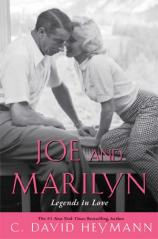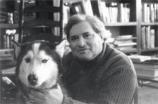Joe and Marilyn: Legends in Love
Review
Joe and Marilyn: Legends in Love
Reading JOE AND MARILYN, the latest volume about the on-again/off-again relationship between the Hall of Fame Yankee and the Hollywood icon, I was reminded what the Jewish sage Hillel said when challenged to explain the entirety of the Torah while standing on one foot. “That which is hateful to you, do not unto another,” he replied. “This is the whole Torah. The rest is commentary.”
The late C. David Heymann’s final book falls along this concept. DiMaggio loved Monroe (in his fashion); Monroe loved DiMaggio (in hers). The rest is commentary. And a lot of it.
Heymann offers bits and pieces from dozens of other sources. In one uncited reference, he includes a passage about one of Monroe’s nurses meeting DiMaggio: ‘“I immediately recognized [him],’ she said. ‘He was a tall, handsome, imposing figure in a double-breasted dark blue suit, French cuffed-shirt, hand-painted tie, spit-polished shoes, and a designer overcoat on his arm.”’ The book is full of similarly detailed accounts of what people wore, the hotels in which they stayed, the meals they ate, the alcohol they drank, etc. --- apparently more interested in appearances than substance. None of the references are specifically cited. I suppose providing footnotes would have added more pages than the publisher was willing to accommodate.
"In the beginning chapters, DiMaggio is described as petty, mean and inconsistent. But later, and contrary to more contemporary bios, Heymann refers to him as a kinder, gentler soul, heartbroken to realize he did not enjoy her favors exclusively, which led to the verbal and occasionally physical abuse."
Celebrity biographies and memoirs have become much more explicit in recent years, a reflection of prurient times. A generation ago, authors never would have included anatomical descriptions and euphemisms for genitalia. Monroe is described, charitably, as a woman who enjoyed the company of men. Whether that was a psychological issue --- she was basically unacknowledged by her biological father --- or because she’d become inured of sexual activity, having surrendered to the casting couch on numerous occasions, is a matter for psychologists to answer. DiMaggio, meanwhile, was of a community of macho men who believed they could do what they liked outside the confines of marriage. There are plenty of descriptions about their prowess in the bedroom to be characterized as “voyeuristic.”
The Yankee Clipper was more than a decade older than Monroe when they met. His playing career had recently ended while her acting career was in full glow. He tried to convince her that the Hollywood machine was taking advantage of her. She, on the other hand, understood the game; skimpy clothes, breathy line delivery and suggestive dialogue helped make her a star, although she was constantly trying to reinvent herself as a “serious actress.” The cycle would go something like this: Monroe would wear something DiMaggio thought inappropriate or be out with a male friend. An Othello-like DiMaggio would object, most often with words but sometimes physically. They would briefly separate and reconcile, with promises to behave better. It rarely worked for long, and they were divorced before reaching their first anniversary, the poster couple for those who deeply loved each other but couldn’t stay together.
Monroe’s saga accounts for the bulk of the book. She is primarily portrayed as a victim: of the Hollywood system, of her mental health issues, of her baser urges. She was inquisitive, intelligent, warm, loving to Joe DiMaggio Jr. (the affection of his own father being sorely lacking). She was a gifted but difficult actor with horrible work habits, often arriving on set late, impaired and unprepared, yet she complained of not being taken seriously because of her looks.
Monroe carried on affairs with many men, including, to name just a few, John F. Kennedy and his brother, Bobby; actors Yves Montand and Marlon Brando; and playwright Arthur Miller, whom she would later marry and divorce. All eventually ended in disappointment; the reality of being with “MM” could never match the fantasy.
Monroe’s downward spiral is the accident from which you can’t look away. Her erratic behavior was eventually diagnosed as paranoid schizophrenia, and the increasing dependence on drugs foreshadowed her doom, almost rivalling the hullabaloo surrounding the death of Michael Jackson. Frankly, if all the reports were true --- multiple prescriptions for various barbiturates, sleeping pills, and sedatives proffered by various doctors with questionable ethics --- one wonders how she could function at all.
Heymann --- who died in 2012 --- wrote bestselling biographies on Robert Kennedy, Elizabeth Taylor and Jackie Kennedy Onassis, among others. He earned a bit of notoriety in 1983 after his book about heiress Barbara Hutton was withdrawn by the publisher because of factual errors. In his New York Times obituary, Margalit Fox wrote, “Though some critics admired Mr. Heymann’s biographies for their comprehensiveness, others were far more caustic. Their concerns included his use of single rather than multiple sources in reconstructing historical events, and his reliance on hearsay accounts by people not directly involved in incidents he was describing.”
Suffice it to say, this tendency seems to carry over in JOE AND MARILYN. A number of characters insinuated and inflated themselves into her story, claiming if only they had done this or that, they might have been able to prevent her suicide (if that was, indeed, how Monroe died; conspiracy theories about murder abound).
In the beginning chapters, DiMaggio is described as petty, mean and inconsistent. But later, and contrary to more contemporary bios, Heymann refers to him as a kinder, gentler soul, heartbroken to realize he did not enjoy her favors exclusively, which led to the verbal and occasionally physical abuse. Despite these conflicts, DiMaggio was always there for Monroe in her most desperate moments, which is what makes this love story so compelling, even 50 years after her death.
Reviewed by Ron Kaplan on August 1, 2014
Joe and Marilyn: Legends in Love
- Publication Date: July 1, 2014
- Genres: Biography, Nonfiction
- Hardcover: 448 pages
- Publisher: Atria/Emily Bestler Books
- ISBN-10: 1439191778
- ISBN-13: 9781439191774





